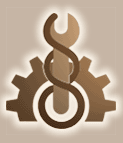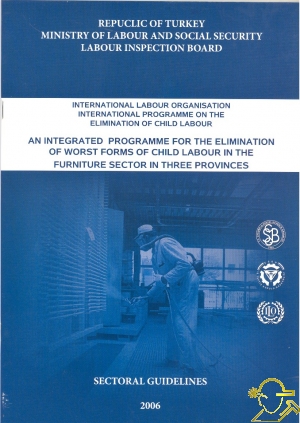 |
 |
 |
An Integrated Programme for The Elimination of Worst Forms of Child Labour in the Furniture Sector in Three Provinces
|
Book : An Integrated Programme for The Elimination of Worst Forms of Child Labour in the Furniture Sector in Three Provinces Author : * -- Language : English Library : Child Labor Publish Place : Ankara ISBN : 975-455-113-8 Publish Date : 00 2006 Publisher : Çalışma ve Sosyal Güvenlik Bakanlığı Book Type : Booklet Book Number : 6346 |
 |
INDEX
CHAPTER ONE: AN OVERVIEW OF THE SECTOR1.1 General Information
1.1.1 Occupational Branch
1.1.2 Occupational Code
1.1.3 Relevant Work and Workplace Regulations
1.1.4 Relevant Vocational Education Regulations
1.2. Sectoral Description
1.2.1. Workplace Descriptions
1.2.2. Woodworking Sector Workshops
1.2.3. Tools, Equipment, Machinery and Workbenches'.
1.2.4. Work Performed :
CHAPTER TWO: DEFINITIONS, LABOUR LEGISLATION AND REGULATIONS GOVERNING CHILD AND YOUTH WORKERS
2.1 Definitions
2.2 Minimum Age and other Legislation Governing the Employment of Child and Youth Workers
2.2.1 Minimum Age for Employment
2.2.2 Work in the Furniture Sector in which Children and Youth Workers May Not Work
2.3 Fundamentals Governing the Employment of Apprentice, Child and Youth Workers
2.3.1 Points to be Observed in the Placement of Child and Youth Workers
2.3.2 Conditions for Apprenticeship
2.3.3 Conditions for Employment of Child and Youth Workers
2.3.4 Obligations of Employers
2.3.4.1 Employment Contracts and Certificates
2.3.4.2 Trainnig and other obligations
CHAPTER THREE: WORKING CONDITIONS, WORKPLACE ENVIRONMENT, HAZARDS AND RISKS
3.1 Working Conditions
3.1.1 Work Organization
3.1.2 Working Hours
3.1.1.1 Work Breaks
3.1.2.2. Activities Considered as Time Spent at Work
3.1.2.3 Prohibition on Overtime Work
3.1.2.4 Prohibition on Working at Night
3.1.3 Payment
3.1.4 Weekly Time Off
3.1.5 National Holidays
3.1.6 Annual Paid Leave
3.2 Workplace Hazards and Risks
3.2.1 Building and Workshop
3.2.1.1 Building, Roof, Foundation, Flooring and Emergency
3.2.1.2. Placement of Workbenches and Machinery, Work Layout, Cleaning
3.2.1.3 Hazardous Areas
3.2.1.4 Guard Rails
3.2.1.5 Special Precautions to be Taken When Working Outside
3.2.1.6 Break Rooms and Rest Areas
3.2.1.7 Work Uniforms
3.2.1.8 Changing Rooms, Showers, Sinks and Toilets
3.2.1.9 Cafeteria
Risks from Machinery, Workbenches, Pressure Vessels, Paintshops,
Raw Materials and Finished Products
Work Equipment Safety Issues
Safety Features
Precautionary Measures to be taken at Woodworking Workbenches
Precautionary Measures for paint workshops
Pressure Tanks
Hazardous Material
Electrical System
Lifting Mechanisms
Ambient Temperature
Lighting
Noise
Dust/Ventilation
Evacuation and Fire Drills
Risk Appraisal and Health and Safety Information
Risk Appraisal
Material Safety Sheets
Machinery Operating Instructions
Warning Signs
Individudal and Organizational Factors
Health Reports
Training and Supervision
Training on Risks
Personal Protective Equipment
Work Assignments
Inspection and Maintenance Teams
Carrying Heavy Loads
Incentive and Dissuasive Practices
First Aid
Registration and Certification
Comparison of Costs of Workplace Accidents and Occupational Disease and Costs of Preventative Measures
PTER FOUR: CONCLUSION


